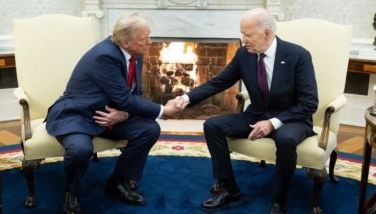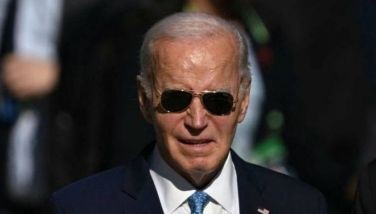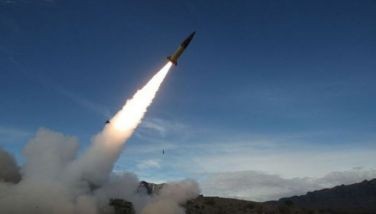US weighs talk of Syria dumping chemical weapons
WASHINGTON — Confronted by the threat of US air strikes, Syria swiftly welcomed the idea of turning over all of its chemical weapons for destruction on yesterday, capping a remarkable chain of events that started with a suggestion from Secretary of State John Kerry, followed by a public proposal from Russia and immediate endorsement by the UN secretary-general.
The Obama administration tried to play down the significance of Kerry's comments and scoffed at the Russian proposal's prospects for success but ended up saying it would consider the idea. President Barack Obama pressed ahead with efforts to win congressional backing for US military action, and officials insisted that Syrian President Bashar Assad's government must be held accountable for using chemical weapons regardless of what happens to its stocks.
Building his case, Obama was appearing in six television network interviews yesterday evening, and administration officials were briefing more members of Congress as they returned from summer recess. Obama will address the nation Tuesday night.
The White House cast Russia's proposal as a direct result of the pressure being felt by Syria because of the threat of a US strike and warned that it would not allow the idea to be used as a stalling tactic.
"Any positive reaction to the suggestion that they would forsake their chemical weapons by the Syrian government would never have been forthcoming if it weren't for the fact that there is a credible threat of US military action," White House spokesman Jay Carney said.
"We would welcome any development - and would have for some time now - that would result in the international control of and the destruction of Syria's chemical weapons stockpile," he added.
Carney sidestepped questions on whether the US and Russia had coordinated yesterday's proposal, saying only, "There are ongoing conversations on this matter at the highest level." Still, he called the Russian proposal "a potential avenue."
The proposal from Russian Foreign Minister Sergey Lavrov came just hours after Kerry told reporters in London that Assad could avoid a US attack and resolve the crisis surrounding the use of chemical weapons by surrendering control of "every single bit" of his arsenal to the international community by the end of the week.
The State Department sought to tamp down the potential impact of Kerry's comments by calling them a "rhetorical" response to a hypothetical question and not "a proposal."
Kerry spoke by phone with Lavrov shortly after making his comments in London, and officials familiar with the call said Lavrov had told Kerry that he had seen the remarks and would be issuing a public statement. Kerry made clear that his comments were rhetorical and were not meant to be a proposal, according to the officials. They added that Kerry told Lavrov that the US was not going to "play games," but the US would be willing to review a serious proposal. They stressed that he made clear that Lavrov could not present the idea as a joint US-Russian proposal.
The officials commented only on condition of anonymity because they were not authorized to describe the information publicly.
Despite the qualifications, Lavrov seized on Kerry's remarks as an opening to present his proposal.
Syrian Foreign Minister Walid al-Moallem immediately embraced it. And then in quick succession, UN chief Ban Ki-moon urged acceptance, British Prime Minister David Cameron said it was worth exploring, the French foreign ministry said it deserved close examination and former Secretary of State Hillary Rodham Clinton said any move by Syria to surrender its chemical weapons would be an "important step." Clinton, in contrast with the White House and State Department, credited Kerry and Russia jointly for the proposal.
Obama faces a decidedly uphill fight to win congressional authorization for the use of force — and serious doubts by the American public — and yesterday's developments, even if they were unplanned, could provide him with a way out of a messy political and foreign policy bind.
Yet, the White House said it does not want Congress to delay votes on use-of-force resolutions while awaiting decisions on whether to proceed with transferring Syria's chemical weapons stockpiles.
At the State Department, spokeswoman Marie Harf said the US would consider the Russian proposal only with "serious skepticism" because it might be merely a stalling tactic. She said Syria had consistently refused to destroy its chemical weapons in the past.
In fact, she said the developments made it even more important for Congress to authorize the use of force against Syria as a means for pushing Assad to actually get rid of chemical weapons stocks.
The US accuses Assad's government of being behind an attack using sarin gas in a Damascus suburb on Aug. 21, killing 1,429 people. Some other estimates of the deaths are lower, but there is wide agreement that chemical weapons were used. Experts believe that the Syrian government's arsenal of chemical weapons includes nerve agents like sarin, tabun and VX as well as mustard gas.
In an interview with Charlie Rose that was broadcast yesterday on "CBS This Morning," Assad denied responsibility for the Aug. 21 attack, accused the Obama administration of spreading lies without providing a "single shred of evidence," and warned that air strikes against his nation could bring retaliation. Pressed on what that might include, Assad responded, "I'm not fortune teller."
Later yesterday, Syria's foreign minister, meeting with his Russian counterpart in Moscow, addressed the idea of getting rid of any chemical weapons.
"Syria welcomes the Russian proposal out of concern for the lives of the Syrian people, the security of our country and because it believes in the wisdom of the Russian leadership that seeks to avert American aggression against our people," said al-Moallem.
US officials said they were taken aback by Kerry's comments, which came at a news conference with British Foreign Secretary William Hague and in response to a question about what, if anything, Assad could do to stop the US from punishing it for the use of chemical weapons.
"Sure," Kerry replied. "He could turn over every single bit of his chemical weapons to the international community in the next week. Turn it over, all of it, without delay, and allow a full and total accounting for that. But he isn't about to do it, and it can't be done, obviously."
Traveling with Kerry, State Department spokeswoman Jen Psaki tried to blunt the suggestion.
"Secretary Kerry was making a rhetorical argument about the impossibility and unlikelihood of Assad turning over chemical weapons he has denied he used," she said. "His point was that this brutal dictator with a history of playing fast and loose with the facts cannot be trusted to turn over chemical weapons otherwise he would have done so long ago."
And, in a speech, Obama's national security adviser Susan Rice reiterated that the president had decided it is in US interests to carry out limited strikes.
Al-Moallem and Lavrov had not reacted to Kerry's comments when they spoke to reporters immediately after their meeting. But Lavrov appeared before television cameras several hours later to say Moscow would urge Syria to quickly place its chemical weapons under international control and then dismantle them.
"If the establishment of international control over chemical weapons in that country would allow avoiding strikes, we will immediately start working with Damascus," Lavrov said.
"We are calling on the Syrian leadership to not only agree on placing chemical weapons storage sites under international control, but also on its subsequent destruction and fully joining the treaty on prohibition of chemical weapons," he said.
Russia's proposal provided confirmation from Syria's most important international ally that the Syrian government possesses chemical weapons, and al-Moallem's welcome was a tacit acknowledgment. Syria's foreign ministry last year retracted a threat to use chemical weapons, saying it was not acknowledging that it had them.
- Latest
- Trending





























